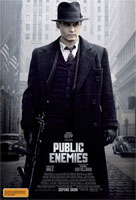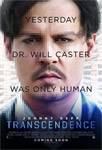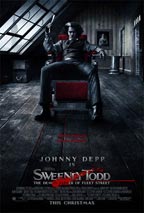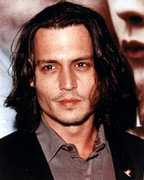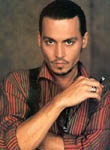Johnny Depp Black Mass
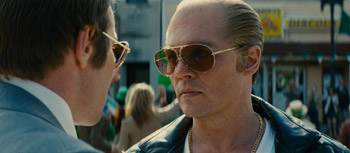
Johnny Depp Black Mass
Cast: Joel Edgerton, Corey Stoll, Johnny Depp, Benedict Cumberbatch, Dakota Johnson, Juno Temple
Director: Scott Cooper
Genre: Action, Drama
Rated: MA15+
Running Time: 122 minutes
Synopsis: The true story of Whitey Bulger, the brother of a state senator and the most infamous violent criminal in the history of South Boston, who became an FBI informant to take down a Mafia family invading his turf.
Black Mass
Release Date: October 8th, 2015
About The Production
WHITEY
You know what I do to rats, John?
CONNOLLY
It ain't rattin', Jimmy.
WHITEY
An alliance? Between me and the FBI.
CONNOLLY
No, no. Between you and me…
…An alliance like this doesn't weaken you, Jimmy.
It makes you stronger.
For more than a decade"until his capture in 2011"Boston's most infamous crime lord, James 'Whitey" Bulger, was hunted by the FBI, surpassed only by Osama Bin Laden at the top of the Bureau's Most Wanted List. But the ironic fact is that Bulger might never have risen to the level of power he achieved were it not for the aid and abetment of the FBI. 'Black Mass" explores how a deal between ruthless gangster Whitey Bulger and FBI Agent John Connolly enabled Bulger to expand his criminal empire with complete impunity, as Connolly"blinded by his own ambition"shielded him from investigation, ignoring the rising body count.
Director/producer Scott Cooper relates, 'John Connolly had known Whitey and his brother, Billy Bulger, since they were kids growing up in the small enclave of South Boston, called -Southie.' This story interested me because of the bond between these two brothers, who could not have been more different, and John Connolly, who understood the power of the Bulger clan and had always revered them. John Connolly ultimately allowed Bulger to run amok in the city because he'd wanted to be in Whitey's good graces ever since Whitey rescued him in a playground fight when they were kids."
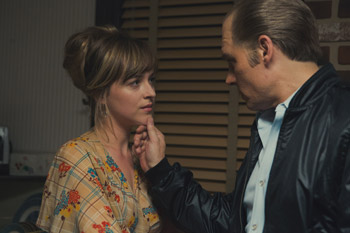 While Connolly was rising through the FBI ranks by taking on the New York Mafia, Whitey Bulger was making a different kind of name for himself back home. As he grew in power, eventually taking over leadership of the local Winter Hill Gang, he was feared by some, but by many others he was something of a Robin Hood figure who was good to, and for, the neighborhood.
While Connolly was rising through the FBI ranks by taking on the New York Mafia, Whitey Bulger was making a different kind of name for himself back home. As he grew in power, eventually taking over leadership of the local Winter Hill Gang, he was feared by some, but by many others he was something of a Robin Hood figure who was good to, and for, the neighborhood.
Johnny Depp, who portrays James 'Whitey" Bulger, expands, 'Southie was and is a very close knit neighborhood and they were very loyal to Jimmy," he says, using the first name by which Bulger preferred to be called. 'Many people grew up kind of idolising him; many wanted to be him because he did things his own way and, for the most part, he won. But he was also a very charismatic man. He had this draw that made people want to get close to him. They wanted to understand him. They wanted to know him. I found James Bulger to be a fascinating character and was interested in what drove him."
Cast in the role of John Connolly, Joel Edgerton says, 'I think John saw Whitey as a kind of renegade who had this rock star glow about him in the community. To him, there was a deeper connection"he knew the rock star and that rock star had treated him well. Once. I believe he went into the FBI with good intentions and had aspirations of being a great lawman. But on his home turf there was a very blurry line between crime and the law, and if the person you admired was on the other side of the law, it could lead to other aspirations. When you look at the seemingly boundless freedom with which criminals operate…I think he started to get a little intoxicated by that."
Producer John Lesher observes that Connolly's fascination with Whitey might not be so different from the rest of us. 'We know from movies, books and television that people are intrigued by gangsters; they live by different rules than the rest of society. In this particular case, you have a close tie between a notorious gangster, whose brother happens to be the most powerful politician in the state, and a star FBI agent. You couldn't make this up; it's too incredible."
That said, John Lesher acknowledges that the filmmakers did take some creative license in dramatizing the real-life events 'because it would be impossible to adequately portray everything that transpired in a single movie. We composited a few characters and compressed the timeline of some things, but the overall story is based on real events, which makes it extremely compelling."
WHITEY There's informing and then there's informing…
…It's a business opportunity. Get the FBI to fight our wars against our enemies, while they protect us and we do whatever the f*** we want to do.
The explosive revelation that Whitey Bulger had been an informant for the FBI made headlines in The Boston Globe in 1988 and, over the next decade, the details of the corruption spilled out. Then-Globe reporters Dick Lehr and Gerard O'Neill, who broke the story, later laid out the entire case in their book Black Mass: Whitey Bulger, the FBI, and a Devil's Deal, upon which the movie is based. Initially, however, they'd had a completely different slant to their article. Lehr discloses, 'It was originally going to be a tale of two brothers: Whitey and Billy, who grew up in the same house in the South Boston projects and ended up at the top of their respective games, albeit with very different rules."
Benedict Cumberbatch, who plays the role of Billy, concurs that the dichotomy between the two brothers was an intriguing angle to pursue. 'Billy Bulger was a very powerful political figure for many years in the State Senate. If you wanted anything done, you went through him. And then, on the other hand, he's the brother of Whitey Bulger and is fatefully entwined with quite possibly the most infamous criminal of the 20th century. It's a fascinating divide." Johnny Depp agrees. 'Billy went his way and became this very highfalutin' politician, and Jimmy went his way and ended up a king of the underworld. Yet they visited their mom and were a close family even though they were on distinctly different sides."
The exploration of the brothers' remarkably divergent paths was going to be the crux of the article…until the journalists uncovered a stunning twist. John Lehr explains, 'We discovered that even though Whitey was an acknowledged crime boss, he had somehow eluded the authorities with a kind of magical touch. As we started to peel the layers of the onion, we found that, within local law enforcement, it was long suspected something funny was going on between Whitey and the FBI"namely an agent named John Connolly, also from South Boston."
McGUIRE
What makes you so sure that he's gonna be a reliable source…?
CONNOLLY
I grew up with him in Southie.
Jimmy, his brother Billy, and me, and that's a bond that doesn't get broken. If he gives me his word, he will keep it.
'Once we were able to establish that Whitey was an FBI informant, we let the genie out of the bottle," Gerard O'Neill says. 'Informants are the Holy Grail of the FBI and, in turn, the -wise guys' want a friend in law enforcement, so it's a symbiotic relationship. But I don't think Whitey Bulger would have been an informant for anyone who wasn't from Southie. Connolly having grown up in that neighborhood made them simpatico in a way no other agent could be. Connolly was able to use his hometown connection and was recognised and rewarded for having Whitey as an informant, but it was Whitey who was in control."
'At first," Lehr continues, 'it was hard to believe that Whitey was informing for the FBI because it went against everything he stood for. We did corroborate and confirm it and published what turned out to be just the tip of the iceberg."
'And boom…the fuse was lit," O'Neill interjects.
'We didn't know how deep and dark and horrifying it was; that took years to tumble out," says John Lehr. 'But the story opened the door to what later became this epic saga and the historic scandal involving Whitey and the FBI."
Producer Brian Oliver, who originally optioned John Lehr and Gerard O'Neill's book, notes, 'What interested me was the notion that the FBI would have high level mob people working for the Bureau"or the FBI thinking they're working for them. It shows anybody can get sucked down the rabbit hole. Connolly probably thought he was doing the right thing until he knew he was doing the wrong thing, but there was no going back."
The screenplay for 'Black Mass" was written by Mark Mallouk and Jez Butterworth, who each saw how the neighborhood ties that bound Connolly and Bulger formed a knot that couldn't be undone. Mark Mallouk says, 'It's about how ambition erased the better part of the good works Connolly achieved when he started out in the FBI. He wanted to save Boston from the Italian mob; that was his intention when he put his toe in the pool and started helping Whitey. He thought it would be a mutually beneficial relationship. But there is no putting your toe in the pool with someone like Whitey Bulger. You're underwater right away."
'It becomes a case of the tail wagging the dog," adds Jez Butterworth. 'This force Connolly was hoping to harness on behalf of the FBI ends up the other way around, with Whitey holding the reins. Anyone who wasn't so embroiled with Bulger would probably have recognised what was happening, but for some reason Connolly didn't."
Scott Cooper reveals that the unique dynamic between the characters was largely what intrigued him about the script. 'I tend to be drawn to the deeply tragic and the deeply human and this film offered up both. It's almost Shakespearean in nature and dealt with themes I like to explore: corruption, deceit and hubris, all wrapped into a narrative I felt it would be very interesting to mine."
There are also the contrasting"and sometimes conflicting"portraits of family: the family to which you are born, personified in Whitey and Billy, and the family born of the streets, seen through Connolly and Whitey and also through Whitey and the Winter Hill Gang. 'I think James Bulger ran his crew like a family and looked at those people as his real family," says Johnny Depp.
Another aspect of family is the one you choose, depicted in the relationships between Whitey and his former girlfriend, Lindsey Cyr, played by Dakota Johnson, and Connolly and his wife, Marianne, played by Julianne Nicholson. 'Lindsey and Marianne bring an emotional quality to the story that would be missing without them," Scott Cooper remarks. 'It is only through their eyes that we see this facet of Whitey Bulger and John Connolly, respectively."
The producers knew that director Scott Cooper was the right choice to capture the themes of deception, ambition and often misguided loyalty woven throughout the film. John Lesher recalls, 'When we met with Scott Cooper, one of the things he said to me, which I loved, was that he wanted to focus on the characters as people first. Then he would sort of pivot the point of view and show what they were up to. I think he really achieved that without making them sympathetic or excusing their actions."
'You need a very skilled and extremely intelligent director to figure out how to make a movie work where there are truly no good guys, and in -Black Mass,' that's definitely the case," Oliver notes. 'To pull off a story where the characters have real arcs, but without any of them as your hero, is a hard thing to do, and Scott navigated those waters amazingly well."
'Scott Cooper is a rare talent," Johnny Depp attests. 'I was blown away by -Crazy Heart' and -Out of the Furnace'"the depth he exhibited that you might not expect from a relative newcomer"and I really wanted to work with him. On the set, I found it remarkable that this was only his third film. I was stupefied by his ability, the strength of his vision and his passion. He ate, drank and slept this film. I mean, the dude's amazing; I'd shoot the telephone book with him," the actor smiles, emphasising, 'I would! I have tremendous respect for him; he's a great filmmaker with an enormous future."
Kevin Bacon, who appears as Connolly's direct superior in the film, adds, 'I've admired Scott's work and appreciated his process on the set. He fostered a very open and collaborative atmosphere among the cast, so it was a shared and very rewarding experience."
Rounding out the main cast were Rory Cochrane, Jesse Plemons, W Earl Brown, Corey Stoll, Peter Sarsgaard, Adam Scott and Juno Temple.
One element as important to the fabric of the story as the characters was the city in which the drama unfolded. 'Black Mass" was filmed in Boston because 'it could not have been shot anywhere else," Scott Cooper states. 'For me, a specific location or a city allows the audience to really grasp a certain place and time, and Boston is a very distinct town."
Producer Tyler Thompson agrees. 'Boston plays its own role in the movie that couldn't have been duplicated anywhere else. It's an amazing place and the people were wonderful."
'It's a homegrown story," producer Patrick McCormick affirms. 'It still echoes throughout those neighborhoods. We needed to be there to catch the voices, the architecture and, whenever possible, the actual locations where some of the events happened."
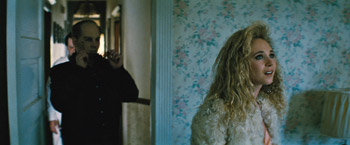 'We understand that people and events get modified for the purpose of a movie," John Lehr says, 'but accuracy in the setting and surroundings is still key, and the cast and filmmakers had almost an obsession to get that right."
'We understand that people and events get modified for the purpose of a movie," John Lehr says, 'but accuracy in the setting and surroundings is still key, and the cast and filmmakers had almost an obsession to get that right." Scott Cooper asserts, 'All films are challenging in one way or another, but especially so when you're dealing with any kind of truth. This particular story was sprawling and had a large cast of players with many different vantage points, so the truth often seemed elusive. It took a great deal of work to creatively show what happened as faithfully as possible."
WEEKS
The truth is, us Irish Southie kids went straight from playing cops and robbers on the playground to doing it for real in the streets. And just like on the playground, it wasn't easy to tell which was which.
The Cast
At the start of 'Black Mass," Whitey Bulger and his Winter Hill Gang are barely even on the FBI's radar. Says Scott Cooper, 'As we enter the film, the Italian Mafia, centered in the North End of Boston, are the real power players. Bulger and his Irish-American Winter Hill Gang are small-time racketeers and loan sharks with maybe the occasional murder, but it's Gennaro Angiulo and his soldiers who are running organized crime in the city. When Connolly moves back up to Boston, he understands that in order to rise to the top ranks of the FBI's Boston office, he needs to bring down the Cosa Nostra. And to do that, he needs Whitey Bulger. Connolly believes Whitey could be a wealth of valuable intel. However, he's also an extremely dangerous man, so the FBI is wary about allowing Connolly to use him as an informant."
It turns out the Bureau's concerns are well founded. Whitey agrees to feed Connolly information, becoming what they euphemistically call 'a liaison." Scott Cooper says, 'Quite frankly, you're talking about a man without conscience who is extremely bright and cunning, and now he has unfettered access to all levels of crime in the city and the ability to do whatever he wants. That's a recipe for disaster, and the consequences ultimately became the biggest scandal in the history of the FBI."
Evoking the adage that there is honor among thieves, Johnny Depp contends, 'First and foremost, Jimmy Bulger is"in his own mind and his own heart"a man of honor. His immediate response to Connolly is that he would never be a rat. He's not going to rat on his own people, for nobody, for nothing. But helping the FBI get the Italian Mafia is a business decision that, without question, works for him. I mean, if you're offered that kind of clemency, you're going to take it, and he takes it and runs with it. He ends up giving the FBI very little and gets a lot in return, so it's kind of brilliant on his part."
Scott Cooper calls Johnny Depp's Whitey Bulger 'a character unlike any he's ever played. Whitey could be charming, but he was also a man who, in the blink of an eye, would just as soon kill you as look at you. Johnny Depp understood that Whitey Bulger is not a likable character for the most part; there's a very vicious side to him, which you've never seen before from Johnny Depp.
'But," the director continues, 'what he wanted to do was create a full-bodied portrait"to show him as flawed as he is maniacal, ruthless but also human. There's a danger to that because we don't want people to say we're humanizing a man who personified evil. We certainly show all levels of his brutality. He was a stone cold killer and Johnny Depp plays that to the hilt. He went to great lengths to create his performance through a tremendous amount of research and in-depth discussions between the two of us and others. From the way he moved to the timbre of his voice, he was able to inhabit fully the sociopath that is Whitey Bulger."
Johnny Depp offers, 'One of the great challenges in -finding' James Bulger is that he's a pretty mysterious fellow. I got to know him mainly through friends and people he worked with in those early years. That was helpful in being able to literally grab hold of the character and hang on. For me it was walking that tightrope between playing a very dangerous, unpredictable walking time bomb who could also be emotional and even sensitive."
The actor confirms that his portrayal involved more than delving into his character's psyche. 'It's also very important, when you're playing someone who existed or exists, to approach it with respect, no matter what. It's their life, so regardless of what they may have done, they deserve as close to an honest version of themselves as humanly possible. So that's where prosthetics come into play. Joel Harlow, who did the makeup for the film and whom I've worked with for years, did an amazing job."
Scott Cooper adds, 'Johnny Depp wanted to fully embrace the physical aspects of the character. Whitey Bulger was balding and blue-eyed while Johnny Depp has dark eyes and a full head of dark hair. But between Johnny Depp and Joel Harlow, they nailed Whitey perfectly. Through archival footage and photographs, they were able to develop a very complex process to get all of Whitey's facial features right: the distance between his eyes and his nose; the sneer of his lip; his chin; his hairline… It was so convincing that when he walked on the set, people who knew Whitey found it chilling."
'He really, really looked like Whitey," avows Dick Lehr. 'He had that same body language and swagger. It was eerie and very effective."
Acting opposite Johnny Depp, Joel Edgerton says, 'What Johnny Depp was able to do with his role"from the inside as well as the outside"was very special. I love working with actors who can make you think, -Okay, that's definitely not him right now,' and Johnny Depp is certainly one of them. He became Whitey Bulger."
'Working with Joel Edgerton was such a joy," Johnny Depp reciprocates, 'because you could throw anything at him and he'd knock it back. When you can have that sort of emotional ping pong with another actor and you recognize in them that they're strong enough to take it, that's beautiful. There wasn't one scene Joel and I did together that he didn't try new things or find a different way to go. He surprised me every time. He's a great, great actor."
Like Johnny Depp, Joel Edgerton researched his part, exploring John Connolly's motives and where they led him. 'John is an FBI agent who just came off a glossy arrest of a top Mafioso in New York and got a hero's welcome when he came home. Now he sees an opportunity to be the guy who dismantles the Italian Mafia in Boston, and the way he's going to do that is through his old childhood friend, namely Whitey Bulger. Johnny Depp successfully appeals to him to come on board as a top-echelon FBI informant. That's where things start to get complicated because the deal he makes is: if Whitey can help the FBI take down the Cosa Nostra, then there will be a certain -turn-a-blind-eye' approach from the Bureau toward any dealings Whitey is involved in…with the exception of murder."
WHITEY
…I do not consider this rattin' or informing. This is business.
CONNOLLY
I couldn't have said it any better. You're a liaison. You pretty much do whatever you want, no one's gonna raise an eyebrow, as long as you're leading us into some pretty big busts.
The pact with the devil is done.
'It quickly spins out of control," Brian Oliver expounds, 'because Connolly is hanging around with Whitey to where it's no longer business. He crosses the line and once he crosses that line, Whitey knows he has him."
Connolly has already been seduced by success and the rewards that come with it, so, in his mind, the ends justify whatever means are necessary. Joel Edgerton surmises, 'I think John wants to be celebrated and admired by everybody. But unfortunately that takes him to some dark places. John becomes so enmeshed with Jimmy that he doesn't realise how deep he's gone, how dangerous the landscape has become, and how irretrievable his conscience is. His whole life becomes dismantled by this obsessive relationship and by this need to be constantly affirmed by a criminal."
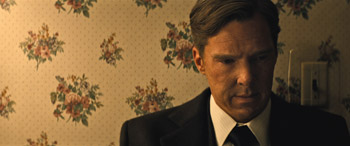 Scott Cooper remarks, 'Joel Edgerton had a very difficult part because John Connolly wears many different masks. With his wife he's one thing; with Billy Bulger he's another; with Whitey yet another; and, of course, he has a completely different mask when he's around his FBI colleagues. Joel delivered such a nuanced performance, perfectly capturing Connolly's bravado and his preening peacock confidence, but also his vulnerability and searing weaknesses, of which he had many. In fact, when the real Fred Wyshak, who had known Connolly for years, came to visit the set, he said Joel was -nailing everything about him in every way.' He's extraordinary."
Scott Cooper remarks, 'Joel Edgerton had a very difficult part because John Connolly wears many different masks. With his wife he's one thing; with Billy Bulger he's another; with Whitey yet another; and, of course, he has a completely different mask when he's around his FBI colleagues. Joel delivered such a nuanced performance, perfectly capturing Connolly's bravado and his preening peacock confidence, but also his vulnerability and searing weaknesses, of which he had many. In fact, when the real Fred Wyshak, who had known Connolly for years, came to visit the set, he said Joel was -nailing everything about him in every way.' He's extraordinary." Joel Edgerton has equal praise for the director, noting, 'Scott Cooper has a good understanding of how to approach each person in their own individual way because you need that singular relationship. He's able to relay whatever information is going to help guide you in a different direction or to an emotional state or wherever else the character needs to go. He is also very passionate and always prepared; he did tons of homework and knew the story inside and out. On a personal level, he's a real gentleman, just an exceptional person with a great energy about him. It was a pleasure to come to work."
Benedict Cumberbatch says the opportunity to collaborate with Scott Cooper was one of the things that attracted him to the project. 'Scott Cooper is an incredible magnet for actors and the work I'd seen in his previous films immediately made me want to see what the game was about. He was an actor, so he comes from a place of complete empathy for what you're doing in front of a camera and knows how to get the best out of a scene. He revels in naturalism"that's his hallmark as a director"so it was a joy working with him on the more intimate moments, the stuff you really enjoy sinking your teeth into as an actor."
Scott Cooper says, 'Benedict Cumberbatch was brilliant as Billy Bulger; he fully embodied that character. He is much taller than the actual person, but you never even think about the physicality of his performance because he really understood the heart of this man and who Billy was to his community. Benedict watched hours and hours of footage and was very specific about the way he carried himself as Billy and the way he spoke, which was different from his brother. It was very clipped and bespoke a man of high education."
That research was vital to Benedict Cumberbatch, who relates, 'There is an added responsibility playing real people. You're not there just as a storyteller; you've got to take into account that these people exist. And how much of that do you sacrifice for the sake of creating a movie? Films are very potent because they do become a kind of history"they form a sort of modern oral history in the sense that they are a way in which we pass these stories and characters on to future generations. So you have to take care…you have to take real care."
BILLY
Jimmy's business is Jimmy's business. It sure as hell ain't none of mine…
CONNOLLY
…You need to hear this, Billy. Your brother is wading into some very dark waters. We all need friends. Even Jimmy.
Even you. Nobody gets there on their own. Ain't that right, Senator?
Benedict Cumberbatch describes his character as 'an extraordinary human being who personifies an old-school, hard-edged, Irish-American political era. He's a fiercely intelligent and erudite man who's imbued with a lot of power, but he's struggling to exist between a rock and a hard place. You see his love for his brother as well as his duties as a civil servant. It's a great tension to play in a character. What we tried to do was deal with the private relationship and try not to suggest whether Whitey was protecting Billy or Billy was protecting Whitey. We left that alone and just focused on the fact that they were two brothers who loved each other very deeply and let the audience come to their own conclusions."
Mirroring their relationship in the film, Johnny Depp says he and Benedict Cumberbatch 'became like brothers. He's a very giving actor and went above and beyond. You could see his heart, you could see him carrying that sense of loyalty and the love between Billy and Jimmy."
Apart from his brother, Whitey's closest confidant is Stephen 'the Rifleman" Flemmi, the only person he trusts enough to share his 'business opportunity" with the FBI. Playing Flemmi, Rory Cochrane says, 'He is less puffed up and definitely quieter than Whitey, but he is just as lethal. Stephen Flemmi is surprised when Whitey tells him about the deal because you can get killed for talking to the cops or the FBI. But the idea is not to give the FBI too much information, and to use them to get tipped off on what's coming down or who's ratting. So they could basically get away with anything."
Tyler Thompson says, 'Rory Cochrane transformed himself into Steve Flemmi, a man of few words. Even spending time with him between scenes, he could be pretty damn scary." John Lesher recalls how Cochrane soaked up the local flavor in preparing for his role. 'I started calling Rory the Mayor of South Boston because he knew everybody," he laughs. 'He totally dove into researching his part and brought such amazing intensity and authenticity to his work. He really helped the film be what it is."
'It was great meeting the people, some who knew Flemmi, and picking up pieces of information along the way," says Rory Cochrane. 'It could be a tiny, little thing, but it all helped."
Rory Cochrane was joined on his jaunts through Southie by castmate Jesse Plemons, who adds, 'The first few weeks, Rory Cochrane and I felt like detectives. We were following every possible lead that could give us a shred of anything that could inform our work."
Plemons gained 40 pounds to portray the newest and youngest member of the Winter Hill Gang, Kevin Weeks. 'Weeks is around 18 years old when we first meet him," Plemons offers. 'He's bouncing outside of Triple O's, which is Jimmy's spot. A brawl ensues and Weeks, who'd done some boxing, fights like a lion, even though the odds are not in his favor. When Whitey comes out and sees that this kid has no quit in him he makes him a soldier in the gang.
'The interesting thing was putting myself in Weeks' shoes and asking, -If I grew up there, if I was raised that way, what would I have done?' It gives Weeks a feeling of power just being the guy standing next to Whitey Bulger. How do you turn down something like that?" Plemons questions.
Scott Cooper says he had Plemons in mind for the role from the start. 'He first came to my notice when I was watching the film -The Master.' I knew I wanted him to play Kevin Weeks from the day I signed on to direct the project. He has a great arc: from a tough kid who's a bit oblivious to a devoted enforcer and a witness to Whitey's pillaging of the city. He's a very soulful actor who's sublime in this film in every way."
Peter Sarsgaard joins the ensemble as Brian Halloran, a peripheral member of the Winter Hill Gang, who makes the mistake of trying to rat out Whitey Bulger to the FBI…namely Special Agent John Connolly.
'Peter Sarsgaard is incredible in this role," states Cooper. 'Brian Halloran is a drug addict, who appears rather unnerved and jumpy, which is understandable given the circumstance in which he puts himself. Peter Sarsgaard really captured his eccentricities and his strung-out nature in a performance that leaves a lasting impression in a relatively short amount of screen time."
A few of Connolly's FBI colleagues see more pitfalls than perks in making Whitey Bulger a top-echelon informant. His direct superior, Special Agent in Charge Charles McGuire, 'is very wary of bringing Whitey into the fold because he knows this is a very vicious man who could ultimately put other agents in harm's way," Scott Cooper affirms.
Charles McGuire is one instance where the filmmakers chose to create a composite character. Scott Cooper explains, 'He is a fictional amalgamation of several different special agents in charge because, in reality, they move on after three or four years and our film spans decades. But I felt it was important to have one person overseeing the operation throughout.
'Charles McGuire is played by Kevin Bacon, and I could not have asked for a better actor for the role," the director continues. 'He fit perfectly into the fabric of this film, from his accent to the way he carried himself"as a man who demands a great deal of respect."
Bacon appreciated the fact that his character 'has a strong moral conscience about corruption and trying to uphold the law. In a way," the actor suggests, 'he's actually the voice of reason within the Bureau, which you need. It's a good balance to have someone who isn't swept up by the idea of using Whitey Bulger to bring the Italian mob down. I think McGuire sees John Connolly as a little bit of a hothead and isn't wowed by his history, his style or his intimidating nature."
Unlike Charles McGuire, another of Connolly's superiors, Special Agent John Morris, allows his better judgment to be clouded by the dogged resolve of John Connolly and the deceptive charm of Whitey Bulger. David Harbour, who appears as Morris, says, 'John Connolly is very sure of himself and gets what he wants done, and Morris admires that. Early on, you see that Connolly is very gung-ho about Bulger as an informant and he convinces Morris. However, there comes a point where they cross the line and start socializing with these gangsters, and Morris is compromising his career and his future to impress this guy. Whitey Bulger can be very gracious one minute and then turn on a dime, and he does that to Morris. That's when the reality of the situation hits him and the clock starts ticking."
In fact, the sands begin to shift with the new arrival of an incorruptible federal prosecutor named Fred Wyshak. Played by Corey Stoll, Wyshak is unimpressed by Connolly's attempt to glad-hand him with Red Sox tickets and can't be dissuaded by the agent's double talk about his lead informant: Whitey Bulger.
'The previous federal prosecutor took a more hands-off approach and didn't interfere with Connolly's corrupt involvement with Bulger," Corey Stoll acknowledges. 'Then Fred Wyshak takes over the office, and he can see that things are not adding up. Whitey Bulger is supposed to be this great informant, but he's really not producing anything. If anything, information is flowing from the FBI to him, which is not the way it's supposed to happen. The first conversation between them is about Fred Wyshak letting him know there's a new regime. He puts the first chink in Connolly's armor."
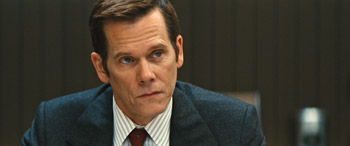 Corey Stoll had the added pressure of having the real Fred Wyshak on set his first day of shooting. 'It was a little nerve wracking at first," he admits, 'but it was also invaluable having him there."
Corey Stoll had the added pressure of having the real Fred Wyshak on set his first day of shooting. 'It was a little nerve wracking at first," he admits, 'but it was also invaluable having him there." Though, in the context of the day, the FBI and the mob were each something of a boys' club, there are women in the story who have a distinct impact on what transpires…even if only as collateral damage.
Juno Temple appears as Deborah Hussey, who 'has a questionable relationship with her stepfather, Steve Flemmi," the actress says cryptically. 'Unbeknownst to her, she ends up on the wrong side of Whitey Bulger, which leads to serious complications for her."
Dakota Johnson plays Lindsey Cyr, who had been Whitey's longtime girlfriend and the mother of his only child. 'Dakota has a sweetness and an earthiness about her that I wanted in Lindsey to counterbalance Whitey's more taciturn nature," says Scott Cooper.
'Lindsey does bring out some level of humanity in Whitey, mainly through their shared love for their son," Dakota Johnson observes. 'It doesn't make him any less terrible a person, but it shows a different side of him."
Marianne Connolly starts to see another side of her husband, John, as he becomes more entangled with Whitey. Cast as Marianne, Julianne Nicholson asserts, 'Marianne is seeing a lot less of her husband and when he's home, she notices how much he's changing: he's wearing flashy watches and fancy suits and even carries himself in a different way. It's basically like he's buying his own hype and becoming somebody else. That's not what she signed on for, so they grow apart."
MARIANNE
You're changing, John… It's Jimmy Bulger that's changing you.
CONNOLLY
…Like it or not, Marianne, you married a street kid. And the streets taught me that you give and you get loyalty from your friends, and loyalty means a lot to me.
Scott Cooper recounts, 'When we first meet John and Marianne, they are deeply in love and brimming with optimism. They've just returned home, the city is beckoning, and the Bureau has high expectations for John to leave a real mark on Boston, which he does…just not in the way they had hoped."
Joel Edgerton comments, 'I think Marianne is the heart of the movie in that she's a reflection of how wayward John is going. The strain on their marriage shows just how far he's gone." Hailing from Medford, Massachusetts, Nicholson had an advantage over most of her castmates, as the instantly recognizable Boston accent came naturally to her. 'It's wicked hard to do a good Boston accent," she nods, incorporating New England's trademark adjective. 'I was really impressed by how everyone handled it."
The cast worked with dialect coaches Howard Samuelson and Carla Meyer to learn the nuances of speaking like a native Bostonian"in most cases, from South Boston specifically. Complicating the task were the various starting points of the international cast.
Joel Edgerton attests, 'I'm an Aussie, and I think this is one of the most difficult accents I've ever had to do. No other accent is more criticized and scrutinized than Boston's because it's very particular. But sometimes the greatest challenges create the best results. You have to trust your instincts and your ear but also do the hard work, and when you're doing it right, you can feel it."
British actor Benedict Cumberbatch notes that his accent had to reflect someone who was born and bred in Southie and"while he never lost touch with his origins"now works in the rarified environment of politics. 'Both worlds are present in his riotous, whip-smart wit on display in the countless hours of footage I watched, including the famous St. Patrick's Day pancake breakfasts he hosted. He was a natural entertainer and a very lively comic and mimic, so we could, and did, go anywhere with his voice."
'I spent time with a bunch of Southie guys who helped me out just by talking," Johnny Depp says. 'They would talk and I'd listen and sponge it up."
Scott Cooper remarks, 'All of the actors have a real ear for dialects and worked hard to get the accent right. When you have an ensemble as large as this, you have to really be on point as to what you want from each actor. The best ones allow you to peer into their souls in a very organic and unfettered way, and I certainly had that in this cast."
WYSHAK
I want Whitey Bulger. If we have to arrest every lowlife in Boston to do that, we arrest them. Every loan shark. Every bookie. Every drug dealer. One of these guys is going to make a case against him.
Beantown
Behind the camera, Scott Cooper also counted on his creative team to convey both the tones and times of the drama. 'I had some remarkably talented people working with me to tell the story in the most authentic and beautifully crafted way. My cinematographer, Masanobu Takayanagi, is a wonderful collaborator. Masa shot my last film and really gets how I compose shots, how I like to light, and when I like to move the camera or not move the camera. My production designer, Stefania Cella, is both an old friend and an extremely talented artist with a wonderful sense of detail. And my costume designer is Kasia Walicka Maimone, who has an extraordinary eye and cares as much as I do about getting it right. So I chose to tell this very American story with the help of a Japanese cinematographer, an Italian production designer and a Polish costume designer," the director laughs. 'But the only thing that matters is they all delivered brilliantly."
There was never any question that 'Black Mass" would be shot in Boston and, whenever possible, 'in the actual locations where certain scenarios took place," Scott Cooper says.
Patrick McCormick adds, 'Our goal in going to the real places was to amplify that feeling of verisimilitude. Being in the old haunts of these characters carries you to that place and time." Depp comments, 'The neighborhood of Southie plays a hugely significant part in the film in terms of Jimmy Bulger's life, his upbringing, and the very definition of who he and the other characters are. Scott certainly understood that."
Scenes were filmed in the Lancaster Street Garage in South Boston, which was the de facto headquarters of Whitey, Stephen Flemmi and the Winter Hill Gang. They also shot along the Neponset River in Quincy, under the overpass where Whitey had many of his victims buried. Working in and around South Boston, the filmmakers were sensitive to the memories of the community. 'We felt a responsibility to the locals, especially those who might have been impacted by the actions of Whitey Bulger," Brian Oliver states.
'The denizens of Boston were very generous and opened their arms to us," Scott Cooper says. 'We couldn't have done it without their support and cooperation at every turn."
One major hurdle was that much has changed in the time since the events depicted in the film. Stefania Cella shares, 'When you're doing a period movie, even 30 or 40 years ago, it's always a challenge to cut back the modernity and a lot of those areas have been renovated over the years. The starting point is research, which is fundamental. We delved into newspaper clippings and photographs and looked at television news footage. We also met with FBI agents and journalists."
Staying true to the period, the modifications included changing signage and bringing in phone booths, which, with the advent of cell phones, have largely disappeared. Even the striping on the roads had to be changed.
Journalist-turned-author Gerard O'Neill recalls, 'I was enormously impressed. They really captured the milieu of Boston in that era."
A few specific locations simply don't exist anymore. The Southie bar, Triple O's, where Whitey and his cronies often hung out, has long since changed hands. 'We had scenes inside and outside Triple O's," says Cella, 'so we went scouting for a place that had the same atmosphere. We found a perfect space in a less gentrified part of Cambridge. We redid the façade of the Polish American Club, turning it into Triple O's, and changed the storefronts up and down the streets."
The suburb of Lynn, Massachusetts, about ten miles north of Boston, also provided exteriors for some street scenes, including the St. Patrick's Day Parade, led by Benedict Cumberbatch as Billy Bulger.
In Chelsea, directly across the Mystic River from Boston, the production converted an empty warehouse to serve as a soundstage for some interiors. One of the main sets Cella and her crew constructed there was the home where Whitey and Billy grew up and where their mother lived until she passed away. Cella details, 'I was able to see archival photographs of the homes in the projects and we scouted a few, but the rooms would have been too small to shoot in and they are nothing like they were in the `70s and `80s. Building it on a stage gave me the freedom to recreate it with the right wallpaper and floors. Then we dressed the sets with pieces that could be changed out to indicate the passage of time."
Two separate locations served as Boston's FBI headquarters. An empty floor in a high-rise office building in the heart of Boston was transformed into Connolly's and McGuire's offices, the interrogation and conference rooms and the organized crime unit's bullpen. A few scenes were also accomplished in the hallway and courtyard of Boston City Hall.
McCormick says the most extreme departure from actual locations was 'cheating Miami in Boston, for which I give Stefania great credit. We were going for Miami in 1982, which doesn't really exist in the way we needed it to. We found a blank slate on Revere Beach, and Stefania referenced some beautiful photographs to replicate a beachside café in Little Havana, with palm trees and white sands and a few period cars. There was no reason to travel to Miami when we could get what we needed right outside of Boston."
Kasia Walicka Maimone also had to blend fact and fiction in creating the wardrobe for the various characters. She says, 'When dealing with real people, I always look for iconic images. There was nothing ostentatious or especially distinctive about the way these gangsters dressed, except Whitey had his own style. Sifting through pictures of him, there were certain things that stood out. Discussing it with Scott, I suggested we keep Whitey in a leather jacket to form one main look and then manipulate other aspects of his wardrobe as the decades change.
So the majority of the film, he is wearing the same style leather jacket, except he switches from black to tan over time."
Maimone also accessorized the character according to her research. 'From the photos, we knew he loved his custom-made cowboy boots," she notes. 'He also liked a belt with an Alcatraz buckle that had been given to him by an FBI agent, so we reproduced that buckle. He consistently wore his jeans quite high-waisted and his t-shirts tight through the decades, so those also became consistent elements of Johnny Depp's costume. He was amazing embodying the persona of his character, which was crucial to how he wore the clothes. You always hope for a collaboration like this"where all the parties speak the same language"and that was very much the case on this film."
The designer found photos of Stephen Flemmi in an off-white jacket, so she dressed Rory Cochrane in lighter-colored jackets for much of the film. For the younger Kevin Weeks, who had been a boxer, she put Jesse Plemons in more functional, sportier clothes and boxing shoes.
'It was an interesting process of building the characters' wardrobe through what we found out about the actual people, while interpreting that information for our own purposes," Maimone says.
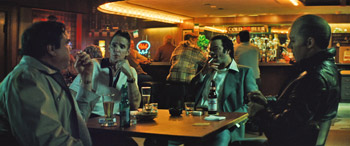 As an FBI agent, John Connolly wore mainly suits and ties, which would seem a relatively easy task for a costume designer. However, Maimone counters, 'Joel Edgerton's costumes were challenging to us because there is such a clear arc that needs to happen with his character. When we first meet Connolly, he is clearly in off-the-rack suits, but we gradually see him go from an understated look to a bit bolder and more tailored suits. We didn't want to hit it too hard, so we took small steps. It was important not to fall too far out of the FBI -box,' so we were walking a fine line."
As an FBI agent, John Connolly wore mainly suits and ties, which would seem a relatively easy task for a costume designer. However, Maimone counters, 'Joel Edgerton's costumes were challenging to us because there is such a clear arc that needs to happen with his character. When we first meet Connolly, he is clearly in off-the-rack suits, but we gradually see him go from an understated look to a bit bolder and more tailored suits. We didn't want to hit it too hard, so we took small steps. It was important not to fall too far out of the FBI -box,' so we were walking a fine line." Billy Bulger's suits were also designed to reflect a change in status, starting out, Maimone describes, 'maybe a hair louder than a politician's should be. But he quickly learns the vocabulary of the world of politics, and his suit becomes impeccable, as befits a man in his position."
In fitting Benedict Cumberbatch to portray Billy, Maimone employed a few tailoring tricks. Widening the legs of the trousers and broadening the shoulders of the jackets helped give the illusion that the actor was somewhat shorter than he is. Additionally, Benedict Cumberbatch put on a few pounds to appear a little stockier than usual. The makeup department also used facial prosthetics to widen his cheeks and round out his face.
Finely sculpted facial prosthetics were also used to give Johnny Depp the visage of Whitey Bulger. Makeup department head Joel Harlow offers, 'From the beginning, it was important to Johnny Depp to look as much like Whitey Bulger as possible. We started with a cyber scan of his head and then, using reference materials from the Internet, I shaped silicone prosthetics. We went through a number of tests before finding what worked: focusing on the forehead and the nose to create an amalgam of Whitey and Johnny Depp. We went to enormous lengths to get the density of the silicone correct, especially on the forehead, so Johnny Depp's expressions would come through organically."
For Whitey's distinctive hairline, the hair department, headed by Gloria Casny, began with Harlow's silicone pieces that had been shaped precisely to Johnny Depp's own head and extended over the forehead down to the eyebrows. Then special effects hair/wigmaker Khanh Trance spent dozens of hours punching thousands of individual strands of hair into the silicone to create the hairline as well as the brows. Gloria Casny explains, 'She had to do one hair at a time to make it look the most natural. I then added a salt-and-pepper back wig to blend into the hairline and cover Johnny's naturally dark hair."
The job was made all the more daunting because each silicone piece could only be used once, 'so we had to do new ones every single day," Gloria Casny says. 'At one point, we had two people helping Khanh in 12 hour shifts, 24 hours a day. We also had to show stages of aging, which we did by increasing the grey and thinning the hair. Different sideburns also reflected the changing times."
'All in all, it's a stunning transformation," Scott Cooper sums up simply.
WEEKS
In the beginning, Jimmy was a small-town player who mattered only in Southie… The next thing you know, he's a goddamn kingpin. You know why? The FBI let it happen.
Closing Notes
When principal photography was complete, Scott Cooper teamed with editor David Rosenbloom in the cutting room and with composer Tom Holkenborg on the scoring stage.
Holkenborg recalls, 'When I saw the movie, I literally came out with sweat on my hands and my knees were shaking. It was very impressive and had an enormous impact on me."
'I knew that was a good start," Scott Cooper smiles. 'He said, -Let me go away and write something, and I'll be back to you in one week.' So he comes back in a week with 48 minutes of music that absolutely crushed me. It was gorgeous. It had all the emotion and the pathos that I wanted and this unsettling feeling that would ultimately course through the narrative. And born out of that suite, Tom crafted a beautifully evocative score that helped give the film its shape."
'The first thing I thought about was what I was going to do for Whitey," says Holkenborg.
'He's such an evil person, so incredibly dark, I wanted to write a theme that would underscore the darkness but also convey the multiple facets of the character. What I came up with is a reoccurring pattern in the low frequencies, heard through piano and cello." 'I think the music really helps take the audience inside the unpredictable and fractured psyche of Whitey Bulger," Scott Cooper observes.
The composer created a rising and falling melody to serve as the theme for John Connolly. He illustrates, 'His theme comes from a low note and goes to a high note that sounds like it's reaching to go even higher but never can, and then goes back to low. It's like he wants so badly to climb up and then something pulls him back down, and as the movie progresses that becomes more and more intense."
Connolly's theme also features a cello motif, which 'actually fits multiple personalities in the film. In fact, the cello is the main instrument in the score," Holkenborg relates.
'The cello is one of my favourite instruments," Scott Cooper says. 'It has an extremely mournful but powerful quality. The music is at times propulsive with a full orchestra, other times with a lush string section. But there are moments, unnerving moments, where it's just a very small selection of strings or a solo cello."
Another instrument featured in the score is the pipe organ. 'It just made sense; I mean the movie is called -Black Mass,'" justifies Holkenborg, who bought an organ specifically to use on the film. 'It's a beautiful instrument and it was nice to have with all its sound capacities. And it was great that Scott embraced it because the point is to serve the ideas the director has for the film.
'With this movie," he continues, 'we agreed restraint was key. But within that range, I had all the creative freedom I could possibly get from a director. I tried to give him something that was out of the ordinary"a little left of center"and he was very welcoming to the emotionally stirring sounds that I felt we needed for the characters in the film."
'Tom is an incredibly diverse composer who fully comprehended the doomed relationship between Whitey Bulger and John Connolly and a city that was forever scarred by Bulger's exploits," Scott Cooper reflects.
Johnny Depp observes, 'I think the main reason Bulger did -set up shop' with Connolly was because he was another Southie boy and they understood each other on that level. That Southie bond is really something and it still exists to this day."
Scott Cooper concludes, 'I wanted to explore the bonds of brotherhood and the bonds of loyalty, but also the unbridled ambition, avarice and hubris that drove these people. It was important to me not to simply tell a story about criminals that happened to be human, but to tell a story about humans, reprehensible or not, who happened to be criminals. And never losing sight of the fact that, in Boston in the 1970s and `80s, certain lawmen and criminals were virtually indistinguishable."
Black Mass
Release Date: October 8th, 2015
Have You Seen This?
MORE
- Mission: Impossible Fallout
- Glenn Close The Wife
- Allison Chhorn Stanley's Mouth Interview
- Benicio Del Toro Sicario: Day of the Soldado
- Dame Judi Dench Tea With The Dames
- Sandra Bullock Ocean's 8
- Chris Pratt Jurassic World: Fallen Kingdom
- Claudia Sangiorgi Dalimore and Michelle Grace...
- Rachel McAdams Disobedience Interview
- Sebastián Lelio and Alessandro Nivola...
- Perri Cummings Trench Interview

